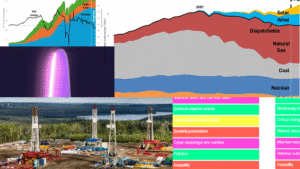Description
In this week’s Frankly, Nate focuses on the importance of the Strait of Hormuz, a geographic location within a 700-mile radius of Israel called the “Black Gold Triangle” where more than half of the world’s remaining oil lies under the sand. In the midst of high-stakes geo-political events where the misery and threats from warring nations dominate discourse, we remain (mostly) energy blind to the choke points that lie at the center of these conflicts, which if disrupted could send our liquid-combustible-fuel dependent economies crashing. How could the threat of expanding regional wars – especially Iran’s potential response in the Strait of Hormuz – impact the world’s reliance on the flow of oil? Who are the people making world-altering decisions – and do they have the best interest of the future in mind? Can a heightened awareness of our global system’s dependency on fragile energy supply chains shift our focus away from escalating risks towards deconfliction and peace?
In French, we have a motto that says that a simple drawing is often better than a long explanation. Jean-Marc Jancovici Carbone 4 President
That’s very understandable because with left atmosphere thinking, one of the problems is that you see everything as a series of problems that must have solutions. Iain McGilchrist Neuroscientist and Philosopher
We can’t have hundreds and hundreds of real relationships that are healthy because that requires time and effort and full attention and awareness of being in real relationship and conversation with the other human. Nate Hagens Director of ISEOF
This is the crux of the whole problem. Individual parts of nature are more valuable than the biocomplexity of nature. Thomas Crowther Founder Restor
Show Notes & Links to Learn More
Download transcript00:55 – Strait of Hormuz, IEA Factsheet
01:20 – Glory Flight
03:43 – Value of oil in terms of human labor
04:01 – Irreplaceability of oil
04:15 – Official global oil produced is 100 million barrels, only 80 million of which are actually crude oil
04:45 – Only 45 million barrels are actually exported
05:25 – 17 million barrels per day pass through the Strait of Hormuz
05:40 – Iranian threats to block the Strait of Hormuz, submarine mines, short range missiles
06:20 – De-mining ships
08:02 – Lindsey Graham, John Cornyn – calls for aggression against Iran
09:35 – Religious history surrounding Israel/Palestine region
10:15 – South Africa, Mauritania, Morocco, and European dependence on oil from the Middle East
11:20 – Iran, Iraq, and Russia have the majority of remaining oil reserves







